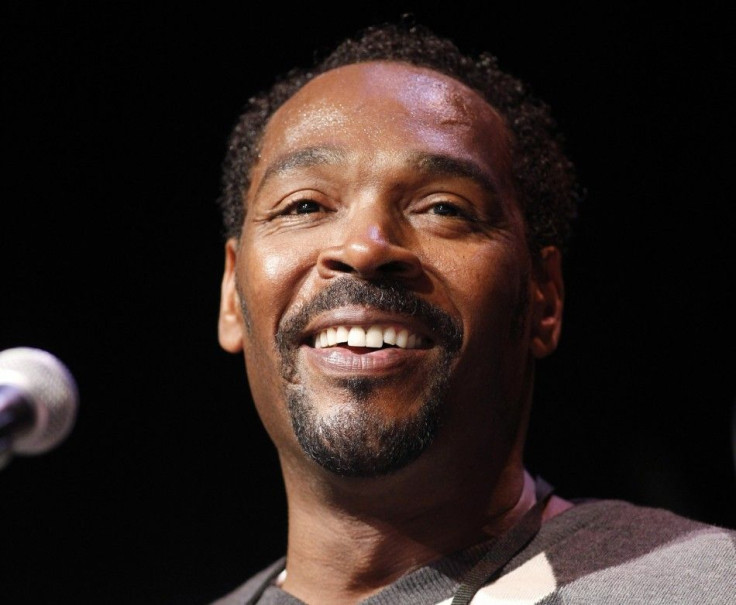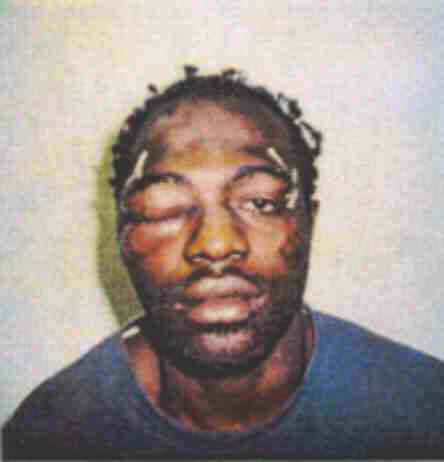The Turbulent Life Of Rodney King: The Reluctant Icon?s Post-Riot Struggles With Substance Abuse And The Law

Rodney Glen King's death has brought back to light the fragile state of race relations in Los Angeles two decades ago. But lesser known are King's own struggles and demons after that fateful night in 1991 that left him the unlikely symbol of injustice and racial tension in America.
The 47-year-old King was found dead at the bottom of his pool Sunday morning in Rialto, Calif., about 50 miles east of Los Angeles. His fiancé Cynthia Kelly called 911 around 5:25 a.m. Pacific Time, with responding officers finding King drowned and eventually pronounced dead at a local hospital.
Police will conduct an investigation and autopsy to determine the cause of death, though early reports claim King had gone on a marijuana and alcohol binge the night before his drowning.
While such early swirling rumors should naturally be discounted with the skepticism afforded most gossip, they tragically do not seem out of character for King, whose struggles to stay clean and out of prison continued well after the enormous 1992 riots in Los Angeles subsided, when West Coast cops began thinking twice before using their nightsticks at will.
Despite characterizations as a ne'er do well, with a rap sheet to match, King always presented himself as a man struggling, and often failing, to shun the path of his alcoholic father. The very same struggle that kept him in trouble for years was the seed the brutal night of March 3, 1991, when he was transformed into a living symbol.
Not far removed from release on parole from a robbery conviction, King was driving home from a night of drinking at a friend's house when he noticed an LAPD car following him. He panicked.
I had a job to go to that Monday, and I knew I was on parole, and I knew I wasn't supposed to be drinking, and I'm like 'Oh, my God,' he told CNN. He hit the pedal, careening down the freeway and local roads.
After giving up on hightailing, King gave in to the cops and decided to slow down and exit into a neighborhood. He was no stranger to what had become a landscape of punch-happy cops ready to dole out punishment to young black men in Los Angeles' dodgier neighborhoods. So he pulled over in a public area close to some apartments, thinking, If something goes down, somebody will see it.
He was right.
King stepped out of his car and laid on the ground as police had instructed him. Then a traffic officer kicked him in the temple. In a panic, King leapt to his feet and ran alongside his car with his hands above his head, trying to prove he didn't pose a threat. The severe beating that ensued, four officers wailing away with nightsticks and zapping King with a stun gun as he writhed on the ground, was caught on tape by a man named George Holliday.

The cops -- Theodore Briseno, Laurence Powell, Timothy Wind and Sgt. Stacey Koon -- were never convicted on charges of assault with a deadly weapon and excessive use of force by a police officer. A three-month trial in suburban Simi Valley, home of the Ronald Reagan Library, before an all-white jury let the cops go without a single guilty charge.
That tape's inability to sway the jury, and the cops subsequent freedom, sparked the deadliest riots in LA history, and one of the most violent and turbulent periods in post-Civil Rights America. It was also a cathartic moment, one of unadulterated carnage and payback for what many felt was years of racial profiling, discrimination and police brutality. King wanted no part of it, though.
For all of his tribulations, he remained a figure fraught with uncertainty and guilt. The riots led to 50 deaths and $1 billion in property damage. And there stood Rodney King, emerged from three days of hiding during the riots. He shunned a statement, angry in tone, written by his lawyers. Instead, he blurted off the cuff words that would bring derision and fame.
People, I just want to say, can we all just get along? Can we get along? he pleaded. It became the clarion call for many, and epitomized King's own misgivings about his new-found life as a symbol of racial injustice. Yet the comparisons to Rosa Parks left him unnerved, as did the angry exchanges.
King admitted later that the blowback from his statement caught him off-guard.
People were mad at me because they didn't think I was going to say, 'Can we all get along?' King told NPR. I had people come up to me and say, 'What the [expletive] did you say that for?!'
The riots subsided, but King's own demons came back in greater force. Because in reality, King later acknowledged that yes, he did break the law, driving drunk and speeding at what he said was easily 100 miles per hour.
I should have pulled over for the police, he said. I was going too fast. I was on parole [for second-degree robbery of a grocery store], and I had been drinking some, too [...] It was wrong, but it didn't mean they should have beat me the way they did.
He was very open about his struggles with alcohol.
The trouble that [people] see me in is a part of my life that I'm working on, he said in a CNN interview in 2011. I'll always have an issue when it comes to alcohol. My dad was an alcoholic. The addiction part is in my blood. What I've learned to do is arrest my addiction -- arrest it myself, so I don't get arrested.
King had won a lawsuit against the city of Los Angeles, garnered $3.8 million in damages. Yet run-ins with the police did not subside. He spent more time in jail, or rehab centers. In the late 1990s, he was arrested for assaulting his ex-wife and daughter.
In 1996, he spend three months in jail for a hit-and-run.
In 2003, King was arrested for allegedly punching a girlfriend and also pleaded guilty to reckless driving after crashing into a house with his car. He was pulled over again on the 20th anniversary of the beating for what was later ruled a minor violation.
King released a book titled Riot Within, two decades after the beating. The tell-all memoir chronicles his life pre- and post-Can we all get along? It revealed a man doomed to struggle with a difficult upbringing at the hands of an alcoholic father who also died in his 40s. The weight was compounded with living at the white-hot center of a racial flashpoint. And, as recently as April, King admitted he was flat broke.
I realize I will always be the poster child for police brutality, but I can try to use that as a positive force for healing and restraint, he wrote.
At times, it proved too much, and King appeared on the VH1 reality show Celebrity Rehab in 2008 to combat his alcoholism.
Sometimes he was doing great, sometimes not, said Bob Forrest, a drug counselor who worked with King on the show. He was always gracious, an honest and gentle soul.
Rodney King was a symbol of civil rights and he represented the anti-police brutality and anti-racial profiling movement of our time, the Rev. Al Sharpton said in a statement. It was his beating that made America focus on the presence of profiling and police misconduct.
King often spoke of wanting to tell his side of the story. In one CNN interview, he said he'd just like to walk people through the footage of the four officers hitting him. It bothered him, he admitted, that some said he retaliated or fought back and deserved the number of blows to his body.
Ultimately, the Riot Within remains the closest distillation to that retelling King was ever afforded.
I've tried more than once over the last twenty years to write about my life experience and what happened to me at the hands of the police and our system of justice, he wrote. I knew I needed to dig deep to get readers to experience what it was really like to be there and how it felt, in the aftermath, to rebuild a shattered body and mind. It's now time for me to try to reach out and help others get to their better place. By letting go of the Riot Within, by telling my story truly and honestly, I have been able to heal.
© Copyright IBTimes 2024. All rights reserved.





















